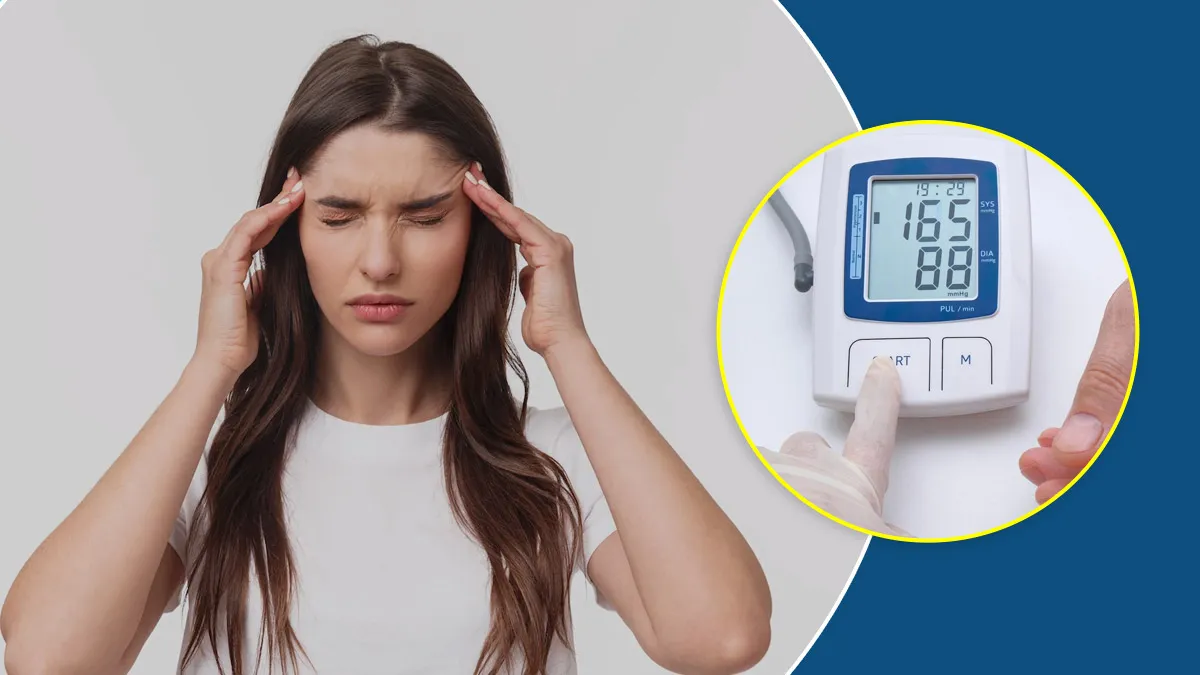
In today's world of constant hurry, anxiety has become a familiar friend for many. Whether one is fretting about work, money, or relationships, the quiet hum of anxiety may indeed be a constant presence. What if, however, that nagging unease is affecting one's physical well-being, particularly blood pressure? According to the experts and researchers, the answer is a resounding yes.
Table of Content:-
Although anxiety is not a direct etiologic agent for chronic high blood pressure (hypertension) like diet or genetics, it can have a strong effect on blood pressure measurement and its variability. Its relationship is vitally important to understand both in the management of anxiety and in the best cardiovascular health.
Anxiety-Blood Pressure Connection And How It Works
In an exclusive interaction with the editorial team of Onlymyhealth, our expert, Dr Shrey Kumar Srivastav, General Physician and Senior Consultant, Sharda Hospital - Noida, explained that to understand the effect anxiety has on blood pressure, we must consider the body's built-in "fight or flight" mechanism. “When you feel anxious, your body responds to perceived danger by a chain of physiological changes that ready you for immediate action,” he highlighted. Your blood pressure enters the picture here:
1. Adrenaline and Cortisol Surge
When anxiety strikes, your adrenal glands release stress hormones like adrenaline (epinephrine) and cortisol. Adrenaline, in particular, causes your heart to beat faster and your blood vessels to constrict.

2. Increased Heart Rate
A faster heart rate means your heart is pumping more blood per minute, leading to a temporary rise in blood pressure.
3. Vessel Constriction
Narrowing of your blood vessels pushes blood through a reduced opening, again raising the pressure against arterial walls.
4. White Coat Hypertension
A perfect illustration of anxiety-related blood pressure increase. Most individuals show increased blood pressure readings when in a physician's office, usually because of fear of the doctor visit itself. Temporary, but it points out the acute effect of anxiety.
5. Chronic Stress and Lifestyle
Chronic anxiety can also result in lifestyle choices that adversely affect blood pressure. For instance, people subjected to chronic stress may be more likely to indulge in poor coping strategies such as overeating, smoking, heavy drinking, or physical inactivity – all of which are predisposing factors for hypertension.
It's also worth noting the difference between acute spikes of anxiety and chronic hypertension. Although anxiety may lead to transient elevations, chronic and extreme anxiety can be involved in developing or exacerbating high blood pressure over a longer period. Repeated triggering of the stress response system can be stressful on your cardiovascular system.

Also Read: Why Some People Continue To Smell Bad Even After Regular Showers: Doctor Explains
Tips for Managing Anxiety and Supporting Healthy Blood Pressure
“The good news is that by managing your anxiety effectively, you can exert a beneficial effect on your blood pressure as well as your overall health,” Dr Srivastav added. Here are some expert-approved techniques:
Mindfulness and Meditation: Mindfulness makes you more aware and enables you to watch your anxious thoughts pass by without getting caught up in them. Regular meditation can reduce stress hormones and induce relaxation, resulting in a slower heart rate and lower blood pressure.
Deep Breathing Exercises: Quick deep breathing exercises can immediately trigger your body's relaxation response. Experiment with inhaling slowly for four counts through your nose, holding for seven, and exhaling fully through your mouth for eight. Repeat a few times.
Regular Physical Activity: Exercise is a very effective antidote to anxiety. Exercise releases endorphins that have a mood-lifting effect and lowers stress hormones. Try to get at least 30 minutes of moderate-intensity exercise on most days of the week.
Balanced Diet: Nourishing your body with healthy foods may stabilise your mood and energy. Restrict caffeine and sugar, which can worsen anxiety, and emphasise whole grains, fruits, vegetables, and lean protein.
Proper Rest: Lack of sleep can increase anxiety and stress. Make 7-9 hours of good quality sleep every night a priority. Develop a regular sleep pattern and have a calming pre-sleep routine.
Moderate Alcohol and Nicotine: Both nicotine and alcohol can raise blood pressure temporarily and, in the long term, worsen symptoms of anxiety. Cutting or quitting them can be very useful for your mental and cardiovascular well-being.
Stress Management Techniques: Identify your stressors and develop healthy coping mechanisms. This could include spending time in nature, pursuing hobbies, listening to music, or engaging in creative outlets.
Connect with Others: Social support is a powerful buffer against anxiety. Share your feelings with trusted friends, family, or a support group.
Set Realistic Goals and Limits: Overcommitting and raising expectations too high can cause anxiety. Practice saying no, delegating, and taking care of yourself.
Professional Assistance: If your anxiety is extreme, constant, and affecting daily living, don't delay consulting a professional. A therapist or counsellor can offer helpful techniques, including cognitive-behavioural therapy (CBT), to overcome anxiety. In some instances, medication may be recommended by a medical doctor.
Regular Monitoring of Blood Pressure: If you have anxiety and are worried about its effect on blood pressure, check your readings frequently at home. Present these to your doctor, particularly if you see consistent increases.
Bottomline
Although the relationship between anxiety and blood pressure is complicated, knowing how they affect each other makes it easy to take charge of your well-being. By adopting stress-reducing techniques and taking a holistic view of your well-being, you can not only calm your anxious mind but also protect the health of your heart for years to come. Remember, a peaceful mind tends to have a healthy body.
Also watch this video
How we keep this article up to date:
We work with experts and keep a close eye on the latest in health and wellness. Whenever there is a new research or helpful information, we update our articles with accurate and useful advice.
Current Version